Islamic & National Events
Category Archives:Islamic & National Events
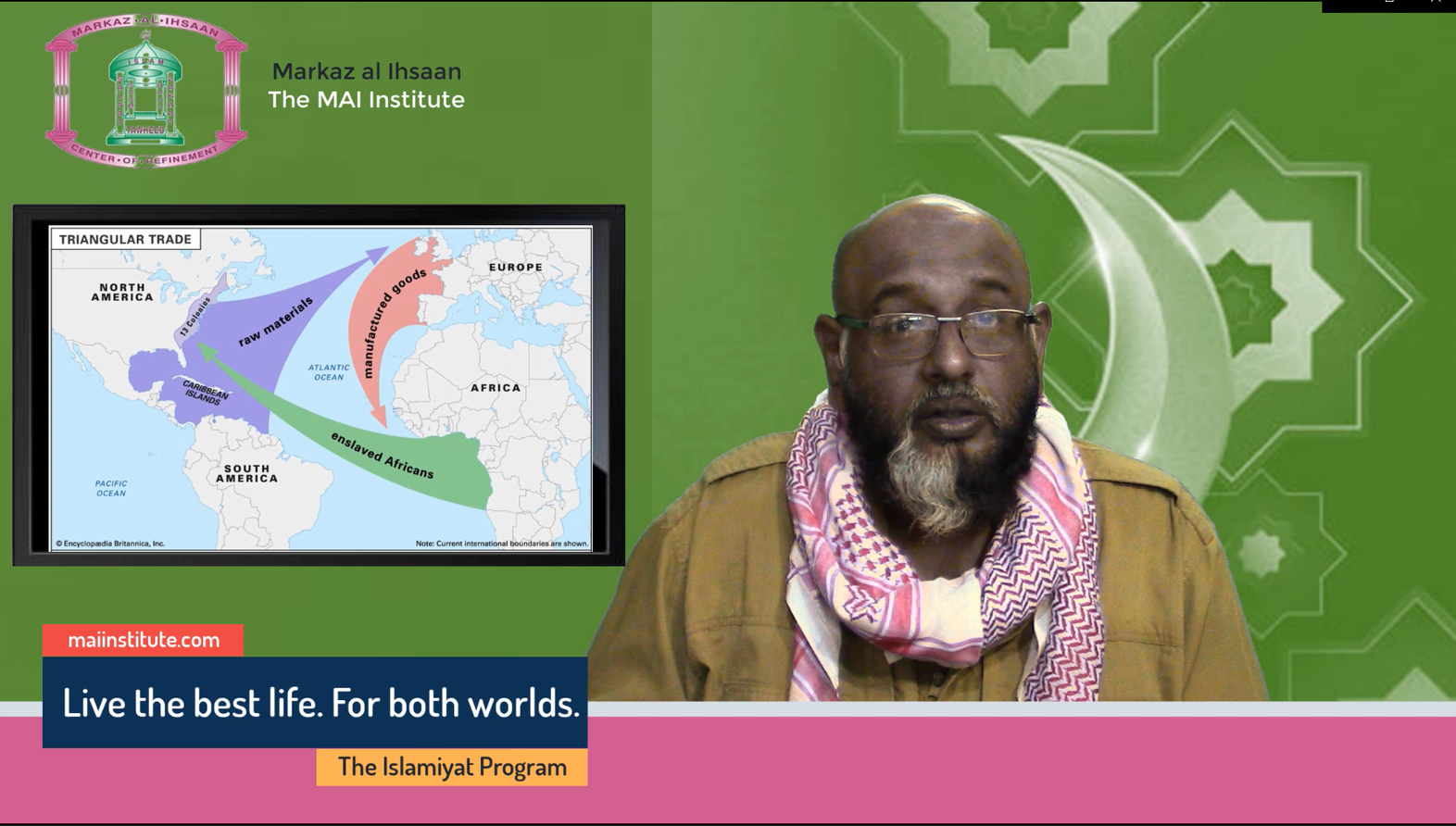
…on the Occasion of Arrival Day
To be any Muslim in the Caribbean is to represent the history of the world. Us being here is the result of the world of historical events coming together.
Prophet Muhammad peace be on him delivered the message of Islam in its form in the period 570 to 622. Islam spread to Africa as early as the 600s and later on India in the 1100s. The Mongolian invasions in the 12-1400s had cut much of the trading on the silk routes, and that had some profound effects on us being here. First of all it channeled the spread of Islam through north Africa into southern Europe, and later later it forced the Europeans to find alternative routes to the east – we had Vasco de Gama sailing south in 1450 and Columbus sailing west in 1492.
We would be more familiar with the slave trade which included some Muslim tribes from Africa coming to T&T, and later the Chinese and Indian indentured labourers who brought with them their religions and customs, which they were free to practice. Later migrations result in a rich tapestry of persons that makes up the community as we know it.
Today we stand proud as a cosmopolitan Muslim community, as the product of every major civilization in world history. Africa, India, China, Mesopotamia, Europe…
Looking back, us being here, is a product of the history of world events and of great civilisations. Looking ahead, insha Allah, we too, in our own humble efforts, hopefully can contribute to the march of civilization, and represent Almighty Allah in all that we do, as we strive to live the best life for this world and the next.
Muhammad (pboh): A Model of Personal Development
On the occasion of Milad un Nabi we take the opportunity to learn more about our Holy Prophet Muhammad peace be on him.
In the Quran Allah tells us in chapter 3.31

Say, O Prophet, if you sincerely love Allah then follow me, Allah will love you and forgive your sins. For Allah is All-Forgiving, Most Merciful.
One of the examples the Prophet peace be on him left for us to follow is to method of personal development – how to become better versions of ourselves, and live a life to earn the best of this world and the next.
He gave us the formula to make that happen. In fact, he lived it. He strived consistently and selflessly for 23 years to establish Islam. For the first 10 years he was vilified and subject to ridicule and abuse by others, including his own family. This was in addition to dealing with the personal loss of his son, his wife and his guardian uncle. But he never gave up. He kept striving. Even after he migrated to Madina, he faced 3 wars in addition to burying 4 of his children, while in his 50’s, before he conquered Makkah. He was alive only 2-3 years after that, and buried 2 more children, before he himself passed away.
Today, he is recognized for his achievements – uniting the tribes, changing social behaviors and values, shifting the focus away from material wealth and fame to knowledge and conduct. He is acknowledged by Muslims and non-Muslims alike as one of if not the greatest leader who ever lived, based on achievement.
The principles he established have led to the formation or formalization of bodies of knowledge – developments in optics, astronomy, navigation, formalization of subjects like chemistry, biology, pharmacology, healthcare; in social sciences establishing the foundation for such disciplines as pedagogy, history, anthropology, sociology, economics; algorithms and algebra; and furthermore consolidation of world knowledge at the time, from civilizations across Greece, India, China, and North Africa.
He left an example as a husband and father, as a neighbor and as a friend. As an orphan, an employee and a migrant. As a social advocate, a revolutionary, a teacher, an Imam, a spiritual guide, a negotiator, a judge, a mediator, a stateman and leader.
He came to show us strength – he had every reason to be depressed; and have anxiety attacks; to be bitter and seek revenge. He chose faith and trust in Allah, and he chose forgiveness. He chose kindness, gentleness, caring and selflessness, even to those opposing him. He knew that everything happened for a reason – everything happened for the best – it was all part of Allah’s plan. In the meantime, he knew he had to do, what needed to be done, and he did it with patience. And endurance.
Today, we know that success in this world is the result of consistency, and success in the hereafter is the result of selflessness and total submission to Almighty Allah.
So how do we achieve these?
Consistency is achieved through discipline and perseverance or endurance.
Discipline we get from routine and habit. Doing something at fixed times every day, whether you want to or not. What helps you build routine? As Muslims we have salaat. Perform these actions within specific time periods during the day, every day. The thing about discipline is once you master it, adding to it becomes easy. You know when you have money you begin to see opportunities to make more money? It is the same with discipline. When you can achieve it, you see opportunities to add more effort, and maintain it easily. So we have a means to build discipline.
The next aspect of consistency is perseverance and endurance. These are achieved through sacrifice – sacrificing preference for patience. Now for later. Sacrifice builds drive and motivation to stay the course even when you are discouraged. Even when you are not seeing results. What helps you build endurance? As Muslims, we have fasting. Voluntarily give up very natural things – eating and drinking – for the duration of the daylight. When you want to control yourself, one of the best things you can do is fast. When you want to tame a wild animal, starve him first and then feed him. It is the same with our nafs. Starve it, then feed it, and you gain control over it. Then you can persevere in other efforts more easily – even when things get difficult you will be more able to see it through to the end.
So we have the means to build our capacity for consistency through discipline (salaat) and perseverance (fasting).
What of selflessness? We get to this point when we can we suspend our ego and care for others as much as we care for ourselves. Even more. In Islam, we are told to love for our brothers what we love for ourselves. How do we achieve selflessness? One way to do this is to give charity. Give charity, even if it is a little bit, often. You give of what you have and remind yourself that you are a custodian of all that you have – you don’t really own it, and the value is what it can do to change lives, not earn bragging rights. It makes no sense amassing it to stand above others, when you can help them instead.
You can also achieve selflessness through Hajj – making the pilgrimage, retracing the steps Bibi Hajar made to save her son, and in doing so becoming lost in the crowd with each person focused on only Allah. No importance is given to you beyond basic safety. It’s a humbling experience and tends to erode one’s ego.
So we know the formula. Consistency and selflessness. We have the tools – salaat, fasting, zakat and Hajj – that’s 4 of the 5 pillars of Islam. All are geared to help you build yourself and live your best life.
In the Quran 12:108 Allah tells prophet Muhammad peace be on him

Say, “This is my way; I invite to Allāh with insight, I and those who follow me.
On the occasion of Milad un Nabi, may we follow the example that we were given. May we achieve consistency and selflessness in all that we do, so that we earn the best for this life, and the next.
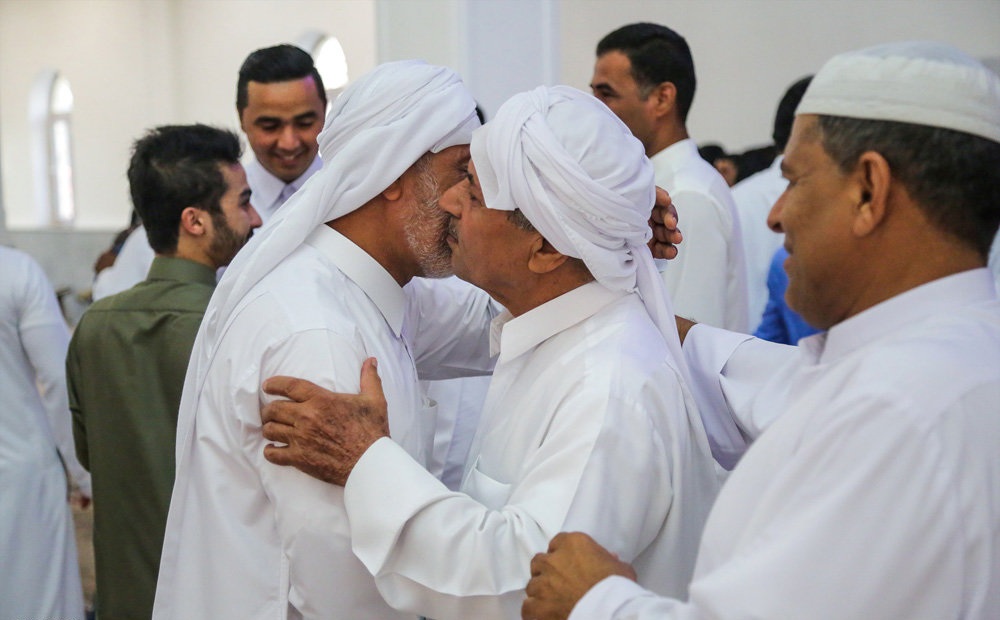
GREETING EACH OTHER WITH SALAAM
By: Farook Mohammed Jr.
Student – MAI Institute
In the world today, we often hear the phrase “Salaam… Salaam”, but what is it? The Merriam-Webster defines Salaam as follows: ‘a salutation or ceremonial greeting in the East.’[1] However, it is much more than that.
The world today has many forms of greetings or salutations which they came about out of traditions, courtesies, and manners, such as “Hello” or “Good day”, or “Top of the Morning to You”. The Salaam is a bit different, not just in literal meaning, but also in the inner context of the phrasing itself; it has a deeper connection and implication for the people who use it; the Muslims.
As Muslims, we are taught that the greeting used for one another is the Salaam. Let’s be clear here, the Salaam is not a single word, but rather a phrase, As-salaamu Alaikum wa Rahmatullahi wa Barkatuhu, and its reply is slightly altered as, Wa Alaikumus-salaamu wa Rahmatullahi wa Barkatuhu. In Arabic script, they look like this:
As-salaamu Alaikum wa Rahmatullahi wa Barkatuhu
اَلسَلامُ عَلَيْكُم وَرَحْمَةُ اَللهِ وَبَرَكاتُهُ
Trans. Eng.: Peace be upon you and God’s mercy and blessings
Wa Alaikumus-salaamu wa Rahmatullahi wa Barkatuhu
وَعَلَيْكُمُ ٱلسَّلَامُ وَرَحْمَةُ ٱللَّٰهِ وَبَرَكَاتُهُ
Trans. Eng.: And upon you be peace and God’s mercy and blessings
Comparison of Greetings
The wording of the greeting is much more than merely arbitrary words put together, but word with meaning and significance, with a prayer for your wellness and goodness in mind.
We are under the impression that these greetings are Muslim-originated but are you aware that these greetings pre-date the advent of the Prophet Muhammad (Allah’s Peace and Blessings Be On Him)? In fact, these greetings, or rather the Hebrew version of it was used by the Jews long before in the time of Musa (Moses). A similar version is also found in Aramaic scripts.
Where Did It Originate?
With the advent of Prophet Muhammad (Allah’s Peace and Blessings Be On Him) we learned about our Salaams and the deeper connection and connotation. In fact, from an Islamically theological point, the Salaams pre-date the arrival of mankind on Earth. We are taught that the origin in a narration from the Prophet Muhammad (Allah’s Peace and Blessings Be On Him).
Abu Huraira reported that the Prophet (Allah’s Peace and Blessings Be On Him) said,
“Allah said: [to Adam] Go and greet with peace these groups of assembled angels and
listen to how they greet you, for this will be the greeting among your progeny.
Adam said: Peace be upon you.
The angels said: Peace be upon you and the mercy of Allah.
Thus, they added the mercy of Allah.”[2]
Don’t you think it wonderful that we use greetings inspired by the Lord himself to mankind to be used as a means of greeting one another? We tend to give attached importance and inner meanings to items which have history behind it. Which salutation is older and more meaningful than the one taught to our first father by the Lord of Mankind and his Angels?
Why is the Reply Different?
A person listening to the Salaams given between Muslims might ask the question, “Why is the reply different in sentence structure from the given Salaam?” When told As-Salaamu Alaikum, why isn’t the reply the same words, As-Salaamu Alaikum? Why is the reply stated as “Wa Alaikumus-Salaam”?
Well, the answer is not a linguistic one, but rather an implied one. You see, the reply is stated with the Arabic word for ‘and’ which is ‘wa’. This means that the reply is connected to the first given Salaam which makes the given and the reply connected as one statement; unity between words and hearts.
Implied Connotation of the Salaams
The Salaams as said above, means much more than just the sum of the words. It holds a deeper meaning for the users. When stated it implies that you are my brother/sister, I trust you and assure you are safe with me, and I am safe with you. It means that we are connected with a bond of brotherhood under our religious code. It assures one another of protection of self and property from harm by one another. With outstretched hands fostering unity and embraces with promote brotherhood, our Salaams are much more than a selection of arbitrary words melded together.

The Importance
So, why is it so important for us? Why is it such a matter of contention amongst people that they pronounce it correctly? Why is it necessary that we expect to be given Salaams from another known Muslim?
As Muslims, the source of all our undeniable teachings and unshakeable practices stem from firstly the Holy Qur’an (Words of the Almighty) and then supported by the Sahih Ahadith (Recorded Sayings/Practices of the Prophet).
In the Holy Qur’an, Our Lord The Most High instructs us,
“…greet one another with a greeting of peace from Allah, blessed and good.”[3]
He further instructs us on a manner of etiquette in replying to the Salaams…
“When a (courteous) greeting is offered you, meet it with a greeting still more courteous,
or (at least) of equal courtesy. Allah takes careful account of all things.”[4]
So, reply the same or better to the Salaam given to you. If you are greeted with As-Salaamu Alaikum, reply with the same or better, such as Wa Alaikum-mus-Salaam wa Rahmatullah.
The Messenger of Allah (Allah’s Peace and Blessings Be On Him) said,
“There are six things due from the believer to another believer:
Visiting him when he is ill, attending (his funeral) to him when he dies, accepting his invitation when he invites, giving him Salam when he meets him, replying to him when he sneezes and wishing him well when he is absent and when he is present.”[5]
The Rewards for Salaams
Are you aware that your Salaams can enter you into the Paradise (Jannah)? Yes! Read the words of our beloved prophet of Allah (Allah’s Peace and Blessings Be On Him). He said,
“O people! Spread (the greeting of) Salaam, feed others, uphold the ties of kinship, and pray
during the night when people are sleeping, and you will enter Paradise with Salaam (Peace).”[6]
He also said to us,
“Shall I not tell you of something which, if you do it, you will love one another?
Spread (the greeting of) peace among yourselves.”[7]
It is also a way to gain closeness to the Almighty. The prophet also said in this aspect,
“They said: ‘O Messenger of Allah! When two men meet, which of them initiates the Salaam?’
He said: ‘The nearest of them to Allah.”[8]
In conclusion, we see that the Salaams are not just words of Hello and Hi, but rather they are words which unify hearts and people, originated and prescribed by the Lord Almighty, as a means of goodness and well-wishes to one another, so that we may get closer to Allah and make it a means of our entry into Paradise.
May we be amongst those who promote and spread Salaams, Ameen.
References:
[1] https://www.merriam-webster.com/dictionary/salaam
[2] Sahih Al-Bukhari, Hadith# 5873.
[3] Holy Qur’an, Surah An-Nur, Chapter 24, Verse 61.
[4] Holy Qur’an, Surah An-Nisa, Chapter 4, Verse 86.
[5] Jami’ At-Tirmidhi, Hadith# 2737.
[6] Riyadus Saliheen, Hadith# 848.
[7] Sunan Ibn Majah, Hadith# 68.
[8] Jami’ At-Tirmidhi, Hadith# 2694.
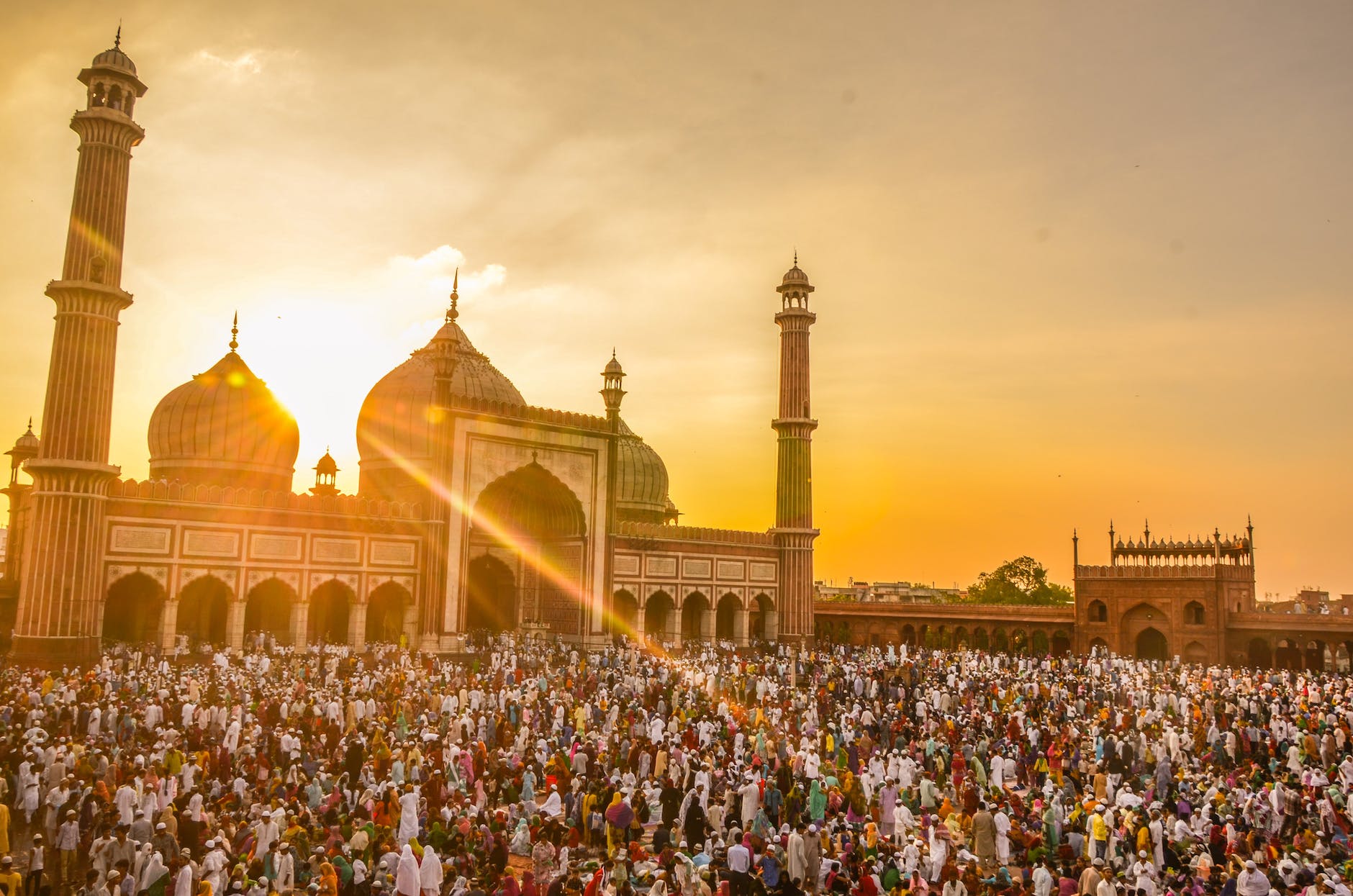
Refining your intention
بِسْمِ اللهِ الرَّحْمَنِ الرَّ حِيْمِ
If you go to a market you will see a lot of people and each one of them will concerned with his or her own business. Each of them would have gone with a purpose that concerns their own affairs.
Like this is the human family. We were all created by Allah and are placed on this earth for a purpose. And that is to represent Allah and prepare ourselves to return to, and Him.
Throughout the history of man you will see tribes and nations that deviated. And when they deviated, Allah sent Messengers to remind them and bring them back. Bring them back to what? This is what we need to understand. To bring them back to the common thread that binds all human beings together. This common thread has one important strand and that is to believe that Allah is the Creator of the Universe.
View the video: https://www.youtube.com/watch?v=h1j3fEXYwBYn&feature=youtu.be
The Messengers came to remind the people of this and in spite of their efforts the people remained divided and disunited; each looking after his own material affairs and not thinking of the return to the Lord. Islam came to remove that kind of thinking and Allah testifies to this is Surah Imran;and ye were on the brink of the pit of fire, and He saved you from it. (3:103)
Muslims are supposed to have one common denominator and that is La Ilaha Illallah; this unites all believers together. There are, however unfortunately some who attest to this but their hearts have not yet joined that human family. For example in our zikir sessions we are joined by one motive and one intention that makes us all part of this family. But in society even amongst the believers you don’t have that common purpose and focus. The reason is because Satan is able to get into the chest of us and is able to effectively whisper in a few to get them to have some sort of selfish motive. And in spite of the fact that they are believers and they harbour love of the religion of Islam, some of them may have ulterior motives. A perfect example is the story of Adam (as) and Satan in the Garden of Eden.
Satan, Adam (as), the Angels, the Jinns all lived together in the Garden. There Satan posed to be a good and trusted friend of Adam and look what he did. He harboured an ulterior motive although he was in the Garden.This is what Islam came to guard us against. Be careful with your intention. Some people profess to be Muslims and in so doing are supposed to submit in totality to Allah and His Rasool (pboh), but they have their own agendas. Perhaps this is why today we have such turmoil in the Muslim world; because we are not living for the sake of Allah.We have to try our best to live for the sake of Allah.
Sometimes we may think ‘if I do something like this I can get personal benefit’. It’s a natural thinking but in so doing we are sacrificing some of the blessings Allah can shower upon us. Then I am not truly living for the sake of Allah. This is a little lower category than a truly righteous believer about whom Prophet Muhammad (pboh) said ‘a Muslim in the Hands of Allah is like a dead in the hands of those who wash him’.True faith is to live for the sake of Allah and understand that whatever is happening to you is coming with Allah’s Permission and Knowledge and He knows why He is doing it. That is why we recite in our duas; ‘We hear, and we obey: (We seek) Thy forgiveness, Our Lord, and to Thee is the end of all journeys’. (2:285)
This is applicable to us all, none of us are perfect. We will at times think of ourselves, however let us all try to grow our Iman and try to think about Allah and His Rasool (pboh) and hope for the best from our Lord.Moses (as) prayed to Allah: “Our Lord! Thou hast indeed bestowed on Pharaoh and His Chiefs splendour and wealth in the life of the present, and so, Our Lord, they mislead (men) from Thy path. Deface, Our Lord, the features of their wealth, and send hardness to their hearts, so they will not believe until they see the grievous penalty”.On the other hand Allah says of Prophet Muhammad (pboh)Thou wouldst only, perchance, fret thyself to death, after them, in grief, if they believe not in this Message. (18:6)
He was so loving and compassionate that he felt sorrow for the nonbelievers who didn’t listen and were using their God giving gifts to destroy themselves and others.Let us try to do our little bit for ourselves and for others and let Allah take care of the rest. This earth belongs to Him, not us. We can do a little and if you do He will take care of you and whatever you are doing. Try to make your intentions more and more refined because we are all humans and it is very possible to get carried away and tempted at times. However when times like these occur hasten to ask your Lord for forgiveness and turn back to Him in the hope for His blessings and forgiveness. May Allah always bless us and take care of our affairs.
Transcript of discourse delivered by Maulana Dr. Waffie Mohammed
The video presentation of this discourse can be accessed at https://youtu.be/h1j3fEXYwBYn
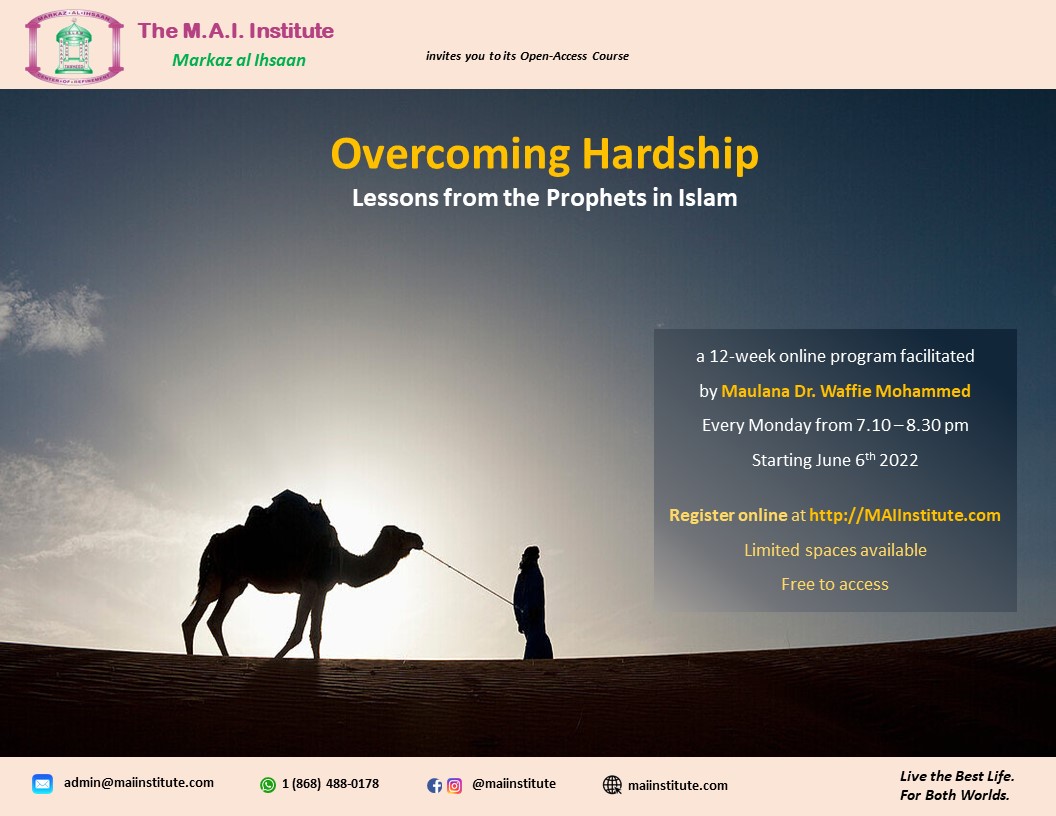
Overcoming Hardship: Lessons from the Prophets of Islam
The world has undergone a period of struggle with Covid restrictions. Emotional difficulties, physical health concerns and loss of loved ones, economic hardship and relationship challenges have all featured, and everyone has been affected in some way or the other. Some more than others, and some in multiple ways.
We are taught in Islam that the Prophets of Allah faced the most difficulties that persons would face, followed by others in different grades. Sa’d ibn Abi Waqqas reported: I said, “O Messenger of Allah, which people are tested most severely?” The Messenger of Allah, peace and blessings be upon him, said, “They are the prophets, then the next best, then the next best. A man is put to trial according to his religion. If he is firm in his religion, his trials will be more severe. If he is weak in his religion, he is put to trial according to his strength in religion. The servant will continue to be put to trial until he is left walking upon the earth without any sin.” [al-Tirmidhī 2398]
From this, we recognize there is much that can be learned about facing and overcoming hardships by examining the lives of the Prophets of Islam. To this end, MAI Institute is pleased to invite persons to access its free course – Overcoming Hardships – Lessons from the Prophets of Islam.
This 12-week online course is scheduled to commence on Monday June 6th, from 7.10 pm – 8.30 pm, and will be done via Zoom.
MAI Students can simply notify Admin to get registered. Any others wishing to register can do so via the following link: https://maiinstitute.com/register-here/ (Note – classes have limited spaces so please register early).
Learn of the various challenges of key different Prophets in Islam, and how that can help you today and in the future.
We hope to see you there.

Level Up! in this life… & the next.
The MAI Institute is currently accepting registration for its Islamiyat Program – a part-time, online program ideal for working professionals and students who want to learn authentic Islam while they tend to their work, studies and families.
Ideal for persons with no prior background in Islamic studies, those seeking to learn authentic Islam practiced from Albania to Zambia, and those who wish to avoid getting caught up in extremist, fundamentalist teachings and influences.
In the face of the chaos of the world today with technological disruption, mushrooming pandemic, unstable climate and social upheaval, Islam continues to provide the roadmap for persons to achieve peace, purpose and performance for the upliftment of themselves, their communities and society at large.
On the Islamiyat Program students will cover the principles, practices and culture of Islam to be a good practicing Muslim, and strategies to engage in society in a more meaningful and influential way.
Classes start in September each year, are conducted online and are open to everyone.
Persons seeking to find out more, or register, can visit https://maiinstitute.com
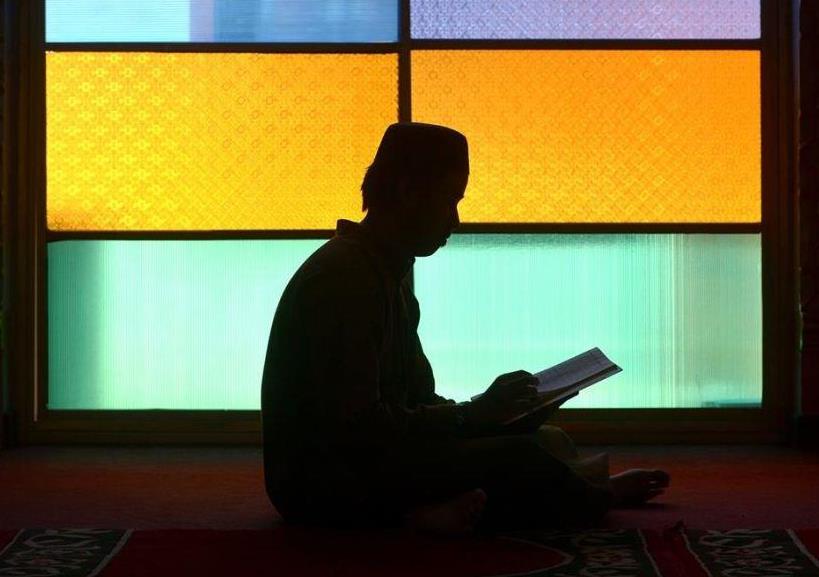
ISTIGHFAR – SEEKING FORGIVENESS IN RAMADAN
Bismillah hir Rahman nir Raheem
In the Name of Allah, Most Gracious, Most Merciful.
I wish to take this opportunity to wish everyone Ramadan Mubarak and remind us it is a special occasion for us to focus on self-reflection and improving our relationship with Almighty Allah. Our beloved Prophet Muhammad (peace be on him) said, ‘’When the month of Ramadan begins, the Gates of Heaven are opened and the Gates of Hell are closed, and the devils are chained.’’ Which of us is void of sins and errors? We are all prone as we are human, but this is a special opportunity for us Muslims in Ramadan to do some powerful supplication and strengthen one’s relationship with Almighty Allah through abundant prayer, reciting Quran, fasting, and seeking Allah’s forgiveness.
A simple dua we must make a habit of saying is ‘Astagfirullah’, which means ‘I seek forgiveness in Allah.’ Prophet Muhammad (peace be on him) used to say this dua at least 100 times a day, and we should strive to do the same as it is a Sunnah or practice of our Prophet (peace be on him). By doing so, especially in Ramadan, Almighty Allah answers our duas, He relieves us from stress and anxiety, we gain a closer bond with Our Lord and we are given an opportunity for Almighty Allah to erase our sins, once we are sincere in repenting from our hearts. It is said that acts of worship and kindness in Ramadan are multiplied up to 700 times in rewards from Almighty Allah!
So my dear friends, do not waste this opportunity to seek forgiveness, whatever sins we have committed. If we make it a habit of saying ‘Astaghfirullah’ on a daily basis, it will help us to refrain from further committing sins and guide us to make better decisions, knowing that Almighty Allah is everywhere, He knows everything, so we will be more mindful of our actions and strive to do good deeds to earn His rewards.
In a Hadith narrated by Abu Dawd, Ibn Abbas said: The Prophet (peace be on him) said, ‘’If anyone constantly seeks pardon (from Allah), Allah will appoint for him a way out from every distress and a relief from every anxiety, and will provide sustenance for him where he expect not.’’
Another reminder is that we must forgive ourselves as part of the process of healing, because we all make mistakes, but Almighty Allah loves us so much He is ready to forgive us and accept our repentance once we turn to Him with sincerity. Prophet Muhammad (peace be on him) said ‘’ Whosoever Glorifies Allah and Praises Him 100 times a day by saying ‘Subhan Allahi wa bihamdihi’, his sins will be obliterated even if they were equal to the foam of the sea.’’
So perform the Tasbih of Astaghfaar now! In one minute, you can say ‘Astaghfirullah’ 100 times! The doors of Repentance are open my friends so do not delay! Tomorrow is uncertain so act today!
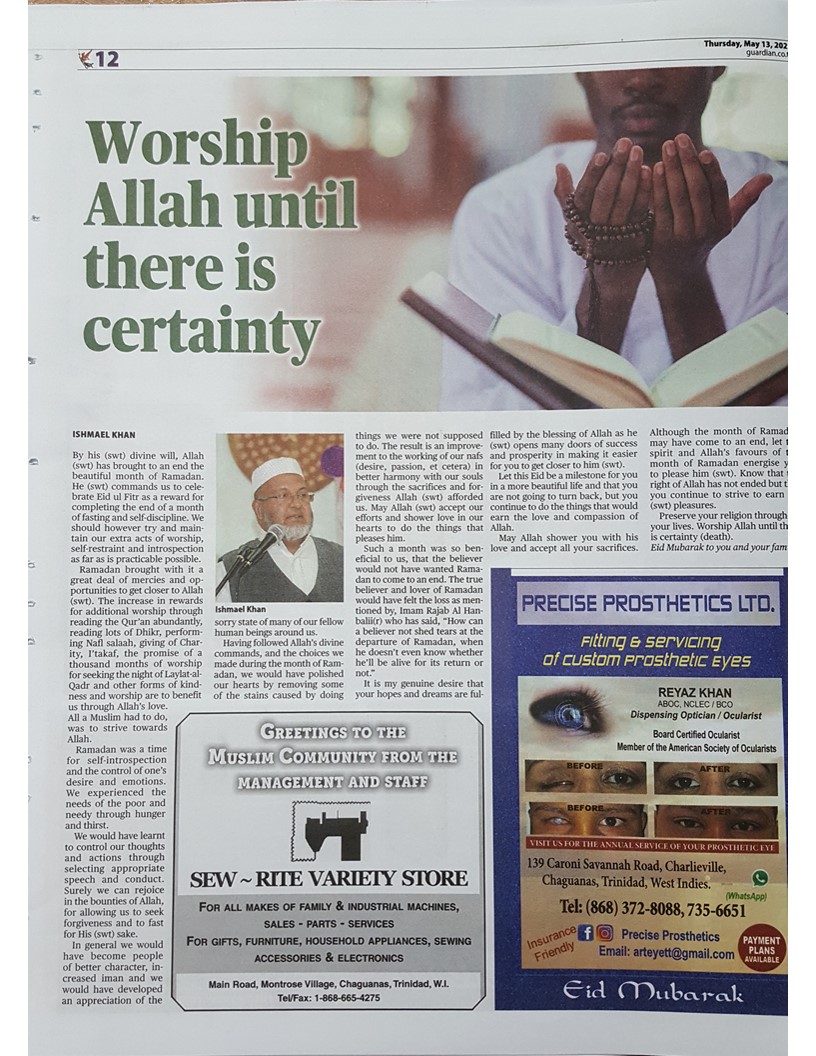
Worship Allah until there is Certainty
Haji Ishmael Khan
By His (swt) divine will, Allah (swt) has brought to an end the beautiful month of Ramadhaan. He (swt) commands us to celebrate Eid ul Fitr as a reward for completing the end of a month of fasting and self-discipline. We should however try and maintain our extra acts of worship, self-restraint and introspection as far as is practicable possible.
Ramadhaan brought with it a great deal of mercies and opportunities to get closer to Allah (swt). The increase in rewards for additional worship through reading the Qur’an abundantly, reading lots of Dhikr, performing Nafl salaah, giving of Charity, I’takaf, the promise of a thousand months of worship for seeking the night of Laylat-al- Qadr and other forms of kindness and worship are to benefit us through Allah’s love . All a Muslim had to do , was to strive towards Allah.
Ramadhaan was a time for self-introspection and the control of one’s desire and emotions. We experienced the needs of the poor and needy through hunger and thirst. We would have learnt to control our thoughts and actions through selecting appropriate speech and conduct. Surely we can rejoice in the bounties of Allah, for allowing us to seek forgiveness and too fast for His (swt) sake. In general we would have become a person of better character, increased iman and we would have develop an appreciation of the sorry state of many of fellow human being around us.
Having followed Allah’s divine commands, and the choices we made during the month of Ramadhaan, we would have polished our hearts by removing some of the stains caused by doing things we were not supposed to do. The result is an improvement to the working of our nafs (desire, passion, etc.) in better harmony with our souls through the sacrifices and forgiveness Allah (swt) afforded us. May Allah (swt) accept our efforts and shower love in our hearts to do the things that pleases him.
Such a month was so beneficial to us, that the believer would not have wanted Ramadhaan to come to an end. The true believer and lover of Ramadhaan would have felt the loss as mention by, Imam Rajab Al Hanbalii (r ) who has said, “How can a believer not shed tears at the departure of Ramadhaan, when he doesn’t even know whether he’ll be alive for its return or not”. It is my genuine desire that your hopes and dreams are fulfill by the blessing of Allah as He (swt) open many doors of success and prosperity in making it easier for you to get closer to Him (swt).

Let this Eid be a milestone for you in a more beautiful life; and that you are not going to turn back, but you continue to do the things that would earn the love and compassion of Allah.
May Allah shower you with His love and accept all your sacrifices. Although the month of Ramadhaan may have come to an end, let the spirit and Allah’s favors of the month of ramadhaan energize you to please Him (swt). Know that the right of Allah has not ended but that you continue to strive to earn His (swt) pleasures. Preserve your religion throughout your lives. Worship Allah until there is certainty (death).
EID MUBARAK TO YOU AND YOUR FAMILY.
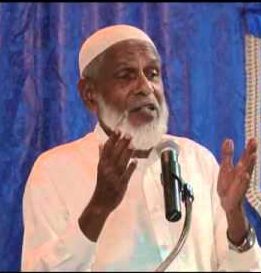
Making the Right Choices
Maulana Dr. Waffie Mohammed
Praises are for Allah, the Originator of the skies and the earth. He created everything from nothing. He alone is the All-Knowing, the All-Wise. Allah is the Lord of Mercy. He says that His mercy encompasses everything. As the Creator, He says that no creature can be like Him.
The human being is a special creation of the Lord. He gave man the capability and capacity to represent Him here on the earth. On one hand, man can behave like the Lord in many ways. For example, man can show love, kindness, compassion, forgiveness, etc. And on the other, hand man is blessed with freedom to choose.
Out of His mercy and favor to man, the Lord sent Messengers to all of mankind wherever they would have been living on the earth. Each Messenger had the mission to teach the people what choices they were to make along the journey of life.
The best model that the Lord gave to the whole world was the life of His final Messenger, Prophet Muhammad (peace be on him). The Lord says about him, “And We have not sent thee (O Muhammad) but as a universal model to mankind.”
Complete representation of the Lord here on the earth was given to mankind with the best lifestyle of Prophet Muhammad (peace be on him) and the complete and perfect code with the Lord’s unadulterated words that He undertook to preserve, in the book called the Holy Quran.
Muslims know that life in this world is for a short span of time, but if properly managed and the correct choices are made all along the journey, the individual is assured of eternal bliss in the Hereafter. The principles of Islam are five. Each one, when properly upheld, helps the individual to know that he is a traveller towards a destination, and should not become attached to the material universe.
Fasting is one of the five principles. The others are belief in the Oneness of God, worship, zakat (charity) and pilgrimage to Makkah once in a lifetime, if one can afford it. Each of the fundamental principles of Islam helps the individual to understand that material life is just for a time, but it can be used to benefit the individual positively on the rest of the journey. So, each individual is required to humbly submit to the way of life given to us all by the Lord. This way of life is called Islam.
While a person is required to submit humbly to what the Lord says is best for us, the cursed one – Satan – makes every effort to discourage the human being from upholding what will be of benefit to him or her on the next phase of the journey. So many people become forgetful and leave behind only material things which have no value to them as they continue on the journey.
The month of fasting strengthens the conscientiousness of the individual to make the right choices all along the journey. Perhaps this is the reason why the Lord says, “If you keep the fast, it is better for you.” We thank Allah for favoring us to be able to witness the month of Ramadan, and to be blessed to be able to keep the fast.
May the Almighty Lord guide us to make the correct choices in this part of our journey, and strengthen our resolve and firmness to follow the path, in this month of Ramadan.
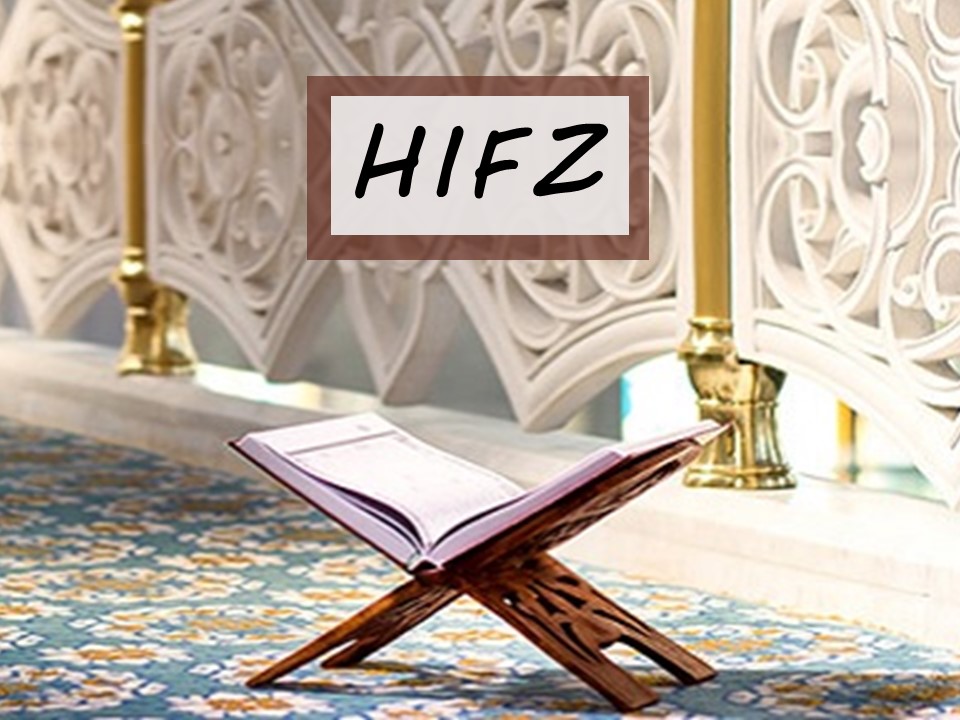
Memorizing the Holy Qur’an
The Holy Qur’an is the book of Almighty Allah divinely revealed (Quran 15:9) through the Holy Prophet Muhammad (peace be on him) for the benefit of, and as guidance to all mankind (Quran 3:19; 3:85; 5:3; 6:90; 7:158; 25:1; 33:40; 57:25). Muslims are instructed to follow its guidance (Quran 6:92; 6:155).
As Muslims we are required to memorize the Qur’an in the performance of the five daily salaat (worship), in which they recite verses from the Qur’an in prayer. Beyond this, there is great merit in memorization of the Qur’an, physically from health benefits to an abundance of blessings and numerous rewards in the afterlife.
Memorization of the Quran is not an easy feat. The Quran is divided into 114 surahs (chapters), containing 6,236 ayah (verses), comprising approximately 80,000 words. To memorize the Quran in 1 year, a person would have to memorize 20 ayah (verses) each day. Even then, to ensure full recall, the Quran must be constantly revised.
Notwithstanding the challenge, in some Muslim countries thousands of children graduate as Hafiz-e-Quran annually. To date the Quran is one of a few, if not the only book – religious or secular – that is memorized by millions of people throughout the world.
There are different techniques used in memorization, which vary depending on individual and teacher propensities and preferences. Some persons prefer to hear the recitation aloud, others to read the script, and yet others to do both. Whatever the method, the expectations are complete and accurate memorization of the verses and chapters being learnt.
Now, you too can begin the journey, and enjoy the benefits, of memorization of the Holy Quran. The MAI method uses both audio and visual cues to support memorization – wherever you are. You can read the text (in Arabic or its English transliteration), and listen along to reciters as they recite verse by verse – slowly, with pauses for you to recite after them, before the next verse begins.
If they methods or their combination proves useful to you, enroll for free (here – https://maiinstitute.com/product/hifz-005/) and follow along to memorize the last 10 chapters of the Holy Quran. More chapters will be added as the course matures.
How To Access
Access is easy.
- Visit https://maiinstitute.com/product-category/short-courses-1/
- Add the product ‘Hifz’ to your shopping cart,
- Checkout,
- Create an account if you don’t already have one (no credit card is required), and
- Submit.
Your login credentials would be emailed to you, and you’re in.
May Almighty Allah bless your efforts.